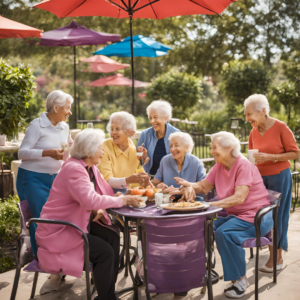As we age, maintaining a high quality of life becomes increasingly important. For seniors, this often means focusing on wellness—not just physical health but also mental, emotional, and spiritual well-being. A holistic health approach addresses these interconnected aspects, offering comprehensive care that promotes overall wellness and vitality.
In this article, we’ll explore the benefits of holistic health for seniors and how integrating these practices into daily life can improve longevity, independence, and happiness.
What is Holistic Health?
Holistic health focuses on treating the whole person, rather than just addressing specific symptoms or ailments. It considers factors like physical health, emotional well-being, mental clarity, social connections, and spiritual fulfillment. This approach emphasizes prevention, balance, and personalized care tailored to an individual’s unique needs.
For seniors, this method acknowledges the diverse challenges they may face—chronic conditions, decreased mobility, cognitive changes, and emotional shifts—while providing tools and strategies to improve overall well-being.
The Core Benefits of a Holistic Approach for Seniors
1. Improved Physical Health
Holistic health incorporates practices that promote physical fitness, such as:
- Exercise: Gentle activities like yoga, tai chi, and walking improve flexibility, strength, and cardiovascular health.
- Nutrition: Personalized meal plans ensure seniors receive essential nutrients to combat age-related health issues like osteoporosis, diabetes, and hypertension.
- Preventative Care: Regular checkups, screenings, and therapies help detect potential issues early, reducing the risk of serious complications.
These practices support seniors in staying active and maintaining a higher level of independence.
2. Enhanced Emotional and Mental Well-Being
Mental and emotional health are critical components of holistic wellness, especially for seniors dealing with life transitions, loneliness, or grief. Key strategies include:
- Mindfulness Practices: Meditation and deep-breathing exercises reduce stress and anxiety, fostering a sense of calm.
- Cognitive Stimulation: Activities like puzzles, reading, or learning new skills keep the brain sharp and prevent cognitive decline.
- Therapy and Support Groups: Counseling or group discussions provide a safe space to process emotions and build connections with others.
Holistic practices help seniors develop resilience, maintain optimism, and experience greater joy in their daily lives.
3. Social Connections and Community Engagement
Loneliness and isolation can have profound effects on seniors’ health. A holistic approach encourages building strong social networks, which may include:
- Joining clubs or interest groups.
- Participating in group fitness classes.
- Volunteering within the community.
Social interaction boosts mood, lowers the risk of depression, and even contributes to physical health by reducing stress-related conditions.
4. Spiritual Fulfillment
For many seniors, spiritual practices play a vital role in holistic health. This may involve:
- Attending religious or spiritual gatherings.
- Practicing gratitude or journaling.
- Spending time in nature to cultivate inner peace.
Spirituality can provide comfort, a sense of purpose, and greater life satisfaction, especially during challenging times.
Key Practices for Seniors Embracing Holistic Health
1. Integrative Medicine
Holistic care often combines traditional medical treatments with alternative therapies like acupuncture, massage, or aromatherapy. These practices can alleviate chronic pain, reduce stress, and promote relaxation without relying solely on medication.
2. Personalized Wellness Plans
Each senior’s journey is unique. A holistic health approach tailors plans to individual needs, taking into account preferences, limitations, and goals. For example, someone with arthritis might prioritize low-impact exercise and anti-inflammatory foods, while another individual might focus on improving mental clarity through meditation and brain exercises.
3. Environment Optimization
Creating a peaceful, safe living environment contributes to overall wellness. Simple adjustments, such as reducing clutter, adding natural light, and incorporating calming colors, can enhance both physical and emotional well-being.
Holistic Health in Action: Real-Life Applications
Many assisted living and senior care communities are adopting holistic wellness programs to enhance residents’ quality of life. These programs often include:
- Fitness classes tailored for seniors.
- Nutritional workshops.
- Art and music therapy sessions.
- Spiritual or mindfulness activities.
For seniors living at home, caregivers can help integrate holistic practices by encouraging regular movement, healthy eating, and participation in local community events.
Why Holistic Health Matters for Aging Adults
Aging is a natural part of life, but it doesn’t have to come with a diminished sense of well-being. A holistic approach empowers seniors to take charge of their health, focus on prevention, and live with purpose and vitality.
By addressing the full spectrum of health—physical, emotional, mental, social, and spiritual—holistic care fosters a balanced and fulfilling lifestyle. It’s not about curing every ailment; it’s about enhancing the quality of life, regardless of age or health challenges.


